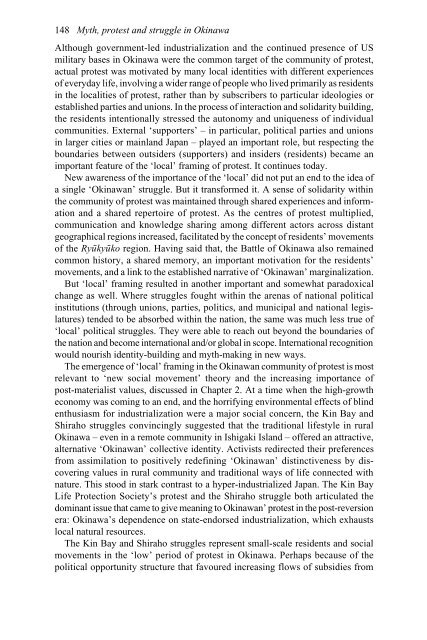Myth, Protest and Struggle in Okinawa
Myth, Protest and Struggle in Okinawa
Myth, Protest and Struggle in Okinawa
You also want an ePaper? Increase the reach of your titles
YUMPU automatically turns print PDFs into web optimized ePapers that Google loves.
148 <strong>Myth</strong>, protest <strong>and</strong> struggle <strong>in</strong> Ok<strong>in</strong>awa<br />
Although government-led <strong>in</strong>dustrialization <strong>and</strong> the cont<strong>in</strong>ued presence of US<br />
military bases <strong>in</strong> Ok<strong>in</strong>awa were the common target of the community of protest,<br />
actual protest was motivated by many local identities with different experiences<br />
of everyday life, <strong>in</strong>volv<strong>in</strong>g a wider range of people who lived primarily as residents<br />
<strong>in</strong> the localities of protest, rather than by subscribers to particular ideologies or<br />
established parties <strong>and</strong> unions. In the process of <strong>in</strong>teraction <strong>and</strong> solidarity build<strong>in</strong>g,<br />
the residents <strong>in</strong>tentionally stressed the autonomy <strong>and</strong> uniqueness of <strong>in</strong>dividual<br />
communities. External ‘supporters’ – <strong>in</strong> particular, political parties <strong>and</strong> unions<br />
<strong>in</strong> larger cities or ma<strong>in</strong>l<strong>and</strong> Japan – played an important role, but respect<strong>in</strong>g the<br />
boundaries between outsiders (supporters) <strong>and</strong> <strong>in</strong>siders (residents) became an<br />
important feature of the ‘local’ fram<strong>in</strong>g of protest. It cont<strong>in</strong>ues today.<br />
New awareness of the importance of the ‘local’ did not put an end to the idea of<br />
a s<strong>in</strong>gle ‘Ok<strong>in</strong>awan’ struggle. But it transformed it. A sense of solidarity with<strong>in</strong><br />
the community of protest was ma<strong>in</strong>ta<strong>in</strong>ed through shared experiences <strong>and</strong> <strong>in</strong>formation<br />
<strong>and</strong> a shared repertoire of protest. As the centres of protest multiplied,<br />
communication <strong>and</strong> knowledge shar<strong>in</strong>g among different actors across distant<br />
geographical regions <strong>in</strong>creased, facilitated by the concept of residents’ movements<br />
of the Ryūkyūko region. Hav<strong>in</strong>g said that, the Battle of Ok<strong>in</strong>awa also rema<strong>in</strong>ed<br />
common history, a shared memory, an important motivation for the residents’<br />
movements, <strong>and</strong> a l<strong>in</strong>k to the established narrative of ‘Ok<strong>in</strong>awan’ marg<strong>in</strong>alization.<br />
But ‘local’ fram<strong>in</strong>g resulted <strong>in</strong> another important <strong>and</strong> somewhat paradoxical<br />
change as well. Where struggles fought with<strong>in</strong> the arenas of national political<br />
<strong>in</strong>stitutions (through unions, parties, politics, <strong>and</strong> municipal <strong>and</strong> national legislatures)<br />
tended to be absorbed with<strong>in</strong> the nation, the same was much less true of<br />
‘local’ political struggles. They were able to reach out beyond the boundaries of<br />
the nation <strong>and</strong> become <strong>in</strong>ternational <strong>and</strong>/or global <strong>in</strong> scope. International recognition<br />
would nourish identity-build<strong>in</strong>g <strong>and</strong> myth-mak<strong>in</strong>g <strong>in</strong> new ways.<br />
The emergence of ‘local’ fram<strong>in</strong>g <strong>in</strong> the Ok<strong>in</strong>awan community of protest is most<br />
relevant to ‘new social movement’ theory <strong>and</strong> the <strong>in</strong>creas<strong>in</strong>g importance of<br />
post-materialist values, discussed <strong>in</strong> Chapter 2. At a time when the high-growth<br />
economy was com<strong>in</strong>g to an end, <strong>and</strong> the horrify<strong>in</strong>g environmental effects of bl<strong>in</strong>d<br />
enthusiasm for <strong>in</strong>dustrialization were a major social concern, the K<strong>in</strong> Bay <strong>and</strong><br />
Shiraho struggles conv<strong>in</strong>c<strong>in</strong>gly suggested that the traditional lifestyle <strong>in</strong> rural<br />
Ok<strong>in</strong>awa – even <strong>in</strong> a remote community <strong>in</strong> Ishigaki Isl<strong>and</strong> – offered an attractive,<br />
alternative ‘Ok<strong>in</strong>awan’ collective identity. Activists redirected their preferences<br />
from assimilation to positively redef<strong>in</strong><strong>in</strong>g ‘Ok<strong>in</strong>awan’ dist<strong>in</strong>ctiveness by discover<strong>in</strong>g<br />
values <strong>in</strong> rural community <strong>and</strong> traditional ways of life connected with<br />
nature. This stood <strong>in</strong> stark contrast to a hyper-<strong>in</strong>dustrialized Japan. The K<strong>in</strong> Bay<br />
Life Protection Society’s protest <strong>and</strong> the Shiraho struggle both articulated the<br />
dom<strong>in</strong>ant issue that came to give mean<strong>in</strong>g to Ok<strong>in</strong>awan’ protest <strong>in</strong> the post-reversion<br />
era: Ok<strong>in</strong>awa’s dependence on state-endorsed <strong>in</strong>dustrialization, which exhausts<br />
local natural resources.<br />
The K<strong>in</strong> Bay <strong>and</strong> Shiraho struggles represent small-scale residents <strong>and</strong> social<br />
movements <strong>in</strong> the ‘low’ period of protest <strong>in</strong> Ok<strong>in</strong>awa. Perhaps because of the<br />
political opportunity structure that favoured <strong>in</strong>creas<strong>in</strong>g flows of subsidies from
















